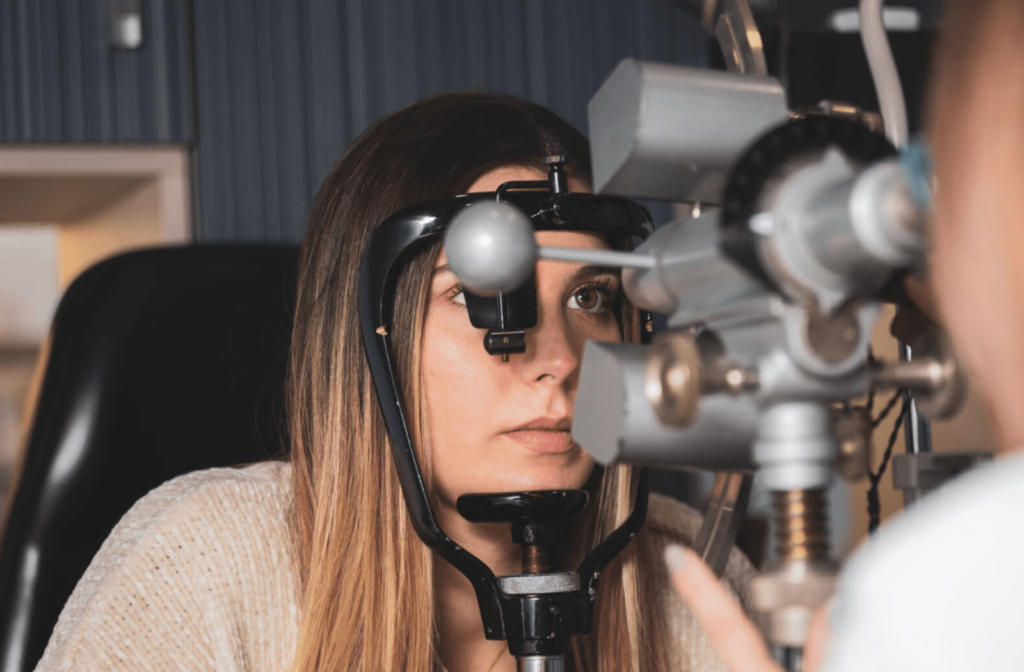Contact lenses can be an excellent alternative to prescription glasses, but they require a more specialized fit from your optometrist to get them just right. A crucial aspect of a contact lens exam is the fitting process that ensures your new lenses fit comfortably and safely.
A contact lens exam and fitting help fine-tune the details and allow your eye care professional to determine if you need specialty lenses. Let’s take a closer look at what to expect during your contact lens exam and fitting and how it benefits your eye health.
The Exam & Fitting Process
A contact lens prescription usually differs from your eyeglasses prescription. Your eye doctor looks for irregularities in the shape of your cornea and helps you find the right specialty lenses for your eyes.
The exam and fitting process is important for your eye health as the wrong contacts or fit can damage your vision. The contact lens exam and fitting process involve multiple steps.
What to Expect During Your Exam
Because contact lenses sit directly on your eye, there are more variables to consider when opting to correct your vision with contact lenses. Your optometrist will take a detailed look at your cornea through an eye surface profiler that helps capture all the measurements of your eye.
The exam also allows your eye doctor to check for refractive errors, such as myopia (nearsightedness), hyperopia (farsightedness), astigmatism, and presbyopia, to add to your prescription details.
Getting the Right Fit
Following a detailed examination of your cornea, the next step is to find the right specialty lenses for your unique visual needs. Your eye care professional will test how the lenses react with your eyes and prioritize your comfort and safety.
The lack of a proper fitting can leave your eyes susceptible to damage and discomfort, so it’s essential to go through the fitting process in person with your eye doctor.
Testing a Trial Pair of Lenses
The trial period is crucial and allows you to try your new contacts for a few days to see how your eyes react to activities of daily living. These activities can include things like using your computer, going in and out of bright areas, and just going about your regular day.
The trial period also includes the added benefit of communicating with your optometrist if you feel discomfort or if the lenses are causing any other issues. If the trial lenses feel great, you will be all set with your new lenses—if not, you will be able to discuss and find another pair that suits your eyes.
Convenient Online Ordering
Once you’re happy with your new contact lenses, you will be able to refill your supply through convenient online ordering.
Ordering your contacts online allows you to save time in your busy life and pick up your contact lenses at a time that works for you.
Different Lenses for Different Needs
Your contact lens exam and fitting help prepare your eyes for your new contact lenses. Let’s explore some of the different contact lenses for specific eye conditions and needs.
Contact lenses fall under 2 main categories: soft contact lenses, and rigid gas permeable (RGP). Among these categories are other specialty lenses used for various visual needs.
SynergEyes Hybrid Lenses
SynergEyes hybrid lenses have a rigid gas-permeable center for optimal vision and a soft lens outer skirt for optimal comfort. These lenses can help correct astigmatism, farsightedness, and nearsightedness. SynergEyes lenses can also be useful for different situations including irregular astigmatism and higher prescriptions.
CooperVision MiSight Contact Lenses
MiSight 1 day contact lenses are daily-wear contact lenses that help slow the progression of myopia.
MiSight lenses help your children overcome the effects of myopia and correct their distance vision.
Multifocal Lenses
Multifocal contact lenses have different powered prescriptions in sections of the lens. These lenses are designed to help correct presbyopia and correct near vision issues.
Scleral Lenses
Scleral contact lenses are an ideal option for those with irregular cornea shapes, dry eye, exposure, surgical complications or who have experienced eye trauma. Scleral lenses test on the sclera, or the white of the eyes, and create a fluid reservoir over the cornea.
This fluid reservoir and extra space allow more oxygen to reach the eye’s surface. Scleral contact lenses help address chronic dry eye, keratoconus, and eye trauma.
Book Your Contact Lens Exam & Fitting Today
No contact lens exam is complete without a comprehensive fitting. Without a proper fitting, your contact lenses can potentially damage your vision and affect your overall eye health. A contact lens fitting allows your optometrist to help ensure your lenses fit comfortably and safely.
Book an appointment with our eye care professionals at 2020 Eyecare Ohio to get a comprehensive exam and fitting today.



